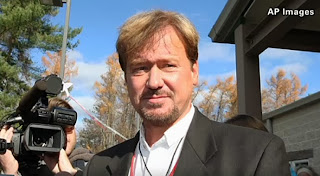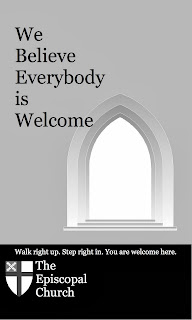The Word became
flesh and dwelt among us
A Sermon for
Christmas I – 12/29/13
All Saints
Episcopal Church, Rehoboth Beach, DE
(the Rev’d Dr)
Elizabeth Kaeton
First, a news flash – especially for those who received (or
are yet to receive) their Christmas presents through FedEx or UPS or the USPS:
Here it is. Ready?
There are Twelve (12) Days of Christmas.
Yes, twelve.
That's even four
more than Chanukah.
Indeed, this is, actually, the 5th Day of
Christmas. So, relax! There’s still plenty of time to celebrate. In the Anglican tradition, these twelve
days are known as Christmastide.
So, on the first Sunday and the fifth day in Christmastide,
St. John’s Gospel tells his own Nativity Story, in his own unique, poetic way.
“In the beginning was the Word, and the Word was with God, and the Word was
God.,” adding, “The Word became flesh and dwelt among us.”
While St. Luke’s gospel is my hands-down favorite, I must
admit that I’m a big fan of St. John’s version of the good news. His
antisemitism is decidedly problematic, but his poetry is often the perfect
expression of the mystery and majesty of the Incarnation.
God made flesh.
Emmanuel. God with us.
How else to express a mystery than through poetry?
During Advent, a small group of us gathered at St. George’s
Chapel Parish Hall to consider some of the words we use during Christmas and
Christmastide – and, in fact, during the whole Christian year.
We looked at words like joy and peace and love – words we toss around lightly and freely - but we wanted to delve more deeply into these words and wondered how we could put some “flesh” on them.
We looked at words like joy and peace and love – words we toss around lightly and freely - but we wanted to delve more deeply into these words and wondered how we could put some “flesh” on them.
On this fifth Day of Christmas, I’d like us to look more
closely at the word ‘joy’. We say, “Merry Christmas,” and, if we’re Anglican,
“Happy Christmas,” but we also sing, “Joy to the World, the Lord is come.”
I wondered about this word, “joy”. How is it different from “merry” and “happy”?
I wondered about this word, “joy”. How is it different from “merry” and “happy”?
When Mary heard from the angel that she was with child, she
was neither merry nor happy. No! She said, “My soul magnifies the Lord, and
rejoices in God my savior.”
She was joyous! Why in the world would an unmarried teenage
girl, reportedly a virgin engaged to a man many years her senior, rejoice at
the news that she was pregnant?
I had an idea about that, but words failed to help me
express my thoughts. I prayed about it for a while and then, one of my Hospice
patients provided me with a story which I would like to share with you this
morning.
Some of you know that it is my privilege to work as a Hospice Chaplain. This is one of the many incredible stories I have heard.
Some of you know that it is my privilege to work as a Hospice Chaplain. This is one of the many incredible stories I have heard.
I’ll call him “Bob”.
He’s a man in his late 60s who is dying. He has less than 20% of his
heart function. It takes great effort for him to get up from his bed and walk
with his walker to go to the kitchen or the bathroom. Indeed, it takes great
effort for him to talk. But, when he does, there are gems to be found among his words.
I began by doing some “life review” with Bob. That’s Hospice
terminology for the practice of helping our patients and their families review
the memories of the events of their lives so they can sort through them and
choose what they want to let go, decide what they need to forgive or be
forgiven, identify those to whom they need to say ‘I love you’ or 'I'm sorry', and what to
cherish and take with them beyond the grave.
I asked “Bob” about his earliest memories. He paused for a
few moments and then said, “I’m at the kitchen table, doing my homework with my
sister. I’m in the second grade. My mother is at the stove, cooking supper.”
“My father walks in from work, looks at us sitting at the
table, and starts yelling. ‘What are you doing?’ I say, ‘I’m doing my homework,
Dad’. With that, my father starts
yelling, ‘Why are you doing that? That won’t put food on the table or a roof
over our heads! It’s a waste of time’. And, with that, he hits me so hard
across the head that I literally fly out of my chair and crash into the kitchen
cabinet.”
“I don’t remember much after that,” he said, in an
unemotional tone, just reporting the facts as he remembered them, “but I do
remember he told me that I wasn’t going back to school, and that, from now on,
I was going to be helping him on the dump truck. And, that’s the way it was,
for as long as I can remember. Oh, I got about an 8th grade
education, here and there, in and out of juvenile detention centers and such.”
“But, I vowed, right there and then,” he said, “to never be
like my father. I vowed that I would never allow the rage that was in me to
erupt onto my family and hurt them. And, I never did. I found a good woman, married, had
two kids, and I never laid a hand to any of them.”
“How did I do it?” he asked sadly, “I worked. Two, three
jobs at a time. I put all my anger, all my rage, into working to provide for my
family. Problem was, I missed out on a lot. I missed out on all the things they
did as kids that I never did, either.”
“Anyway, I don’t think I could have stood it,” he said. “I mean, I
loved that they were in plays and concerts and sports, but it hurt to go to them and
remember that I, myself, missed out on all that. So, instead of getting angry,
I went to work. Work, work, work. That’s all I did.”
“And, you know,” he said, “I think here’s what happened. Here's why I think I'm sick today. I
think I broke my own heart.”
He stopped for a moment to take a deep breath and to swallow
some of his tears. “Don’t,” I said. “Just let it go. Let yourself have a good
cry,” I said. “You can cry with me.”
And, he did. He wept for his children, from whom he is estranged. He wept for his wife,
who could no longer stand a loveless marriage and an absent husband and father,
and finally divorced him five years ago.
When he regained his composure he said, “But, you
know, I’m a very blessed man. You Hospice people have taught me how to love
again. The nurses’ aid comes here every day. The nurse comes twice a week. The
massage therapist comes every week and massages my legs to help reduce the
swelling. You come once a week and pray with me and help me remember the old
hymns I used to sing in church with my mother – the only time in the week when
I knew any kind of peace. And, I find peace, somehow, in hearing you sing those
old hymns.”
“But,” he said, “ you don’t just do your jobs. It's not just work for you. You do it
with love. You guys have shown me
love and, you know, I love you in return."
"And that,” he said, the tears flowing freely, “brings me such great joy. It’s not about being happy. I know from happy,” he said. “I am happy that I was able to provide for my family. I am happy that they had a better life than I did.”
"And that,” he said, the tears flowing freely, “brings me such great joy. It’s not about being happy. I know from happy,” he said. “I am happy that I was able to provide for my family. I am happy that they had a better life than I did.”
“But,” he said, “That was happy. But, now, I know joy. For
the first time in my life, I know joy.”
“I think,” he said, “that when you know that something is
possible, but you’ve never felt it, when you finally do, well,” he said,
“that’s joy. And, I can go to my grave having known joy.”
Listen to that: "When you know something is possible, but you've never felt it, when you finally do, well, that's joy."
Do you hear what I hear?
Listen to that: "When you know something is possible, but you've never felt it, when you finally do, well, that's joy."
Do you hear what I hear?
"And the Word became flesh and dwelt among us."
Because of “Bob” I understand those words in a different
way. I hear the joy embodied in the words of the Magnificat. I hear the joy incarnate in
the shepherds who heard the angels sing. “Peace on earth, good will to all
humankind.”
And, I hear the joy in a 60-something year old man, who
knows abuse and anger and rage, and thought he knew love and happiness, and now
knows joy.
How do you know the joy of Christmas? How do you know the
joy that the disciples first knew? It is possible, you know? To know joy. To
embody joy.
It’s pretty miraculous, but you can know joy. In your heart and in your mind and in your soul and in your whole body. It's the fifth day of Christmas. There's still plenty of time for a Christmas miracle.
It’s pretty miraculous, but you can know joy. In your heart and in your mind and in your soul and in your whole body. It's the fifth day of Christmas. There's still plenty of time for a Christmas miracle.
You have to dig deep to know that sort of joy. Deep. Past
the pleasantries and the niceties.
Deep into your own losses and sorrows. Facing your own mortality. Your
own finiteness. Your own limitability. Your own brokenness. And, then, embrace them. Embrace your own mortality and finiteness and limitability and brokenness.
And,
accept that, in that emptiness, there are possibilities. And then, you, too,
can move beyond mere happiness and know joy. The joy, like peace, that passes
all human understanding.
I’ve learned that happiness is a mortal state. But joy? Joy
is a state of spiritual being.
So, in these Days of Christmas – this fifth of the twelve
days of Christmas – let the world take down the Christmas displays and decorations and put everything on sale, 75% off. They've been up since October, anyway. And let them put up the Valentines Day displays.
It's okay. We know better. We know that there are 12 whole days of Christmas.
So, on this first Sunday of Christmas, here is my Christmastide message to you:
It's okay. We know better. We know that there are 12 whole days of Christmas.
So, on this first Sunday of Christmas, here is my Christmastide message to you:
Sometimes, you have to reach way down – deep down where words have become your flesh – in order
to touch the stars.
Amen.


























